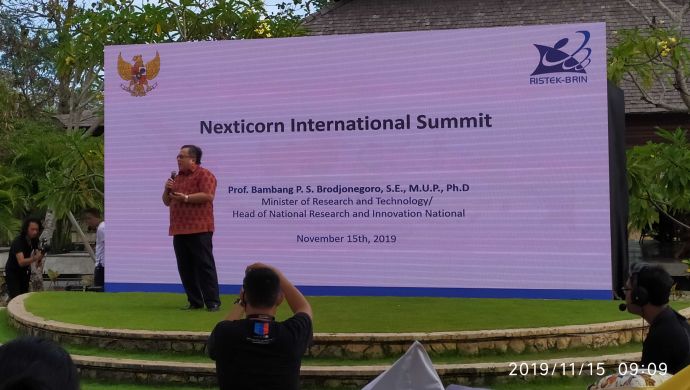
Minister of Research and Technology Bambang Brodjonegoro
As part of its effort to support the national startup ecosystem, the Indonesian government –through the Minister of Research and Technology (Kemenristek)– introduced a Science and Technology Park (STP) programme that includes the setup of incubator programmes in universities nationwide.
Set in three stages that range from pre-startup (search for potential startup), startup (incubation programme), and post-startup (post-incubation and external fundraising), the programme will focus more on the following sectors: Foodtech, transportation, healthtech and medtech, energy, defense and security, material and advanced material, and ICT.
The programme was run by the directorate general of the tech-based startups at the ministry and has been run in the past five years.
Within the period, it has worked with 1,307 pre-startups and startups in the country. Of all these startups, 13 of them have made income beyond IDR1 billion (US$70,000) per year and raised IDR4.5 billion (US$319,000) in funding.
In his keynote speech at today’s Nexticorn International Summit in Bali, Minister of Research and Technology Bambang Brodjonegoro explained how the Indonesian government plans to support the startup ecosystem differently, following the recent setup of the new cabinet.
Also Read: Fintech in Indonesia: While growth declines, companies continue to gain traction
In the past, to support the national startup ecosystem was the focus on The Ministry of Communications and Informatics (Kemenkominfo) and the national creative economy agency (Bekraf), which had recently been merged into the Ministry of Tourism and Creative Economy (Kemenparkraf).
But starting this quarter, the task will be divided between Kemenkominfo and Kemenristek, who had already had a division that is in charge of tech startups.
The task division was meant to create a greater focus within both institutions.
“We are more upstream, responsible to create as many startups as possible. Kemenkominfo will be more on the downstream and infrastructure,” he said.
Speaking to the press at the sidelines of the event, Brodjonegoro further explained that Kemenkominfo will also work on the more consumer-facing categories such as e-commerce and fintech, while Kemenristek will dig into untapped sectors as mentioned above.
The STP programme will also put greater effort into working with startups from rural Indonesian areas.
Facing a tough time
In his speech, Brodjonegoro also explained how the government’s support for the local startup ecosystem will also be part of its effort to withstand the upcoming slowdown of the global economy.
“Next year, the economy is going to slow down with both US and China facing a hard time … But Indonesia had a very good experience in dealing with the global recession. We successfully maintain a four per cent growth rate during the 2008 crisis,” he explained.
“We can replicate our agility to face next year,” the minister stressed.
The Indonesian startup ecosystem is seen as having great potential to draw in foreign direct investments (FDIs).
The minister also stresses on the importance of new jobs creation.
“Jobs loss does not always equal to unemployment. It might also mean new jobs creation with the invention of new ways to work. We can prevent social unrest [caused by jobs loss] by preparing the workforce with a new skill training scheme,” he closed.
—
Want to learn more about fintech in Malaysia? Get the e27 Malaysia Fintech Ecosystem Report 2019 here.
The post Indonesia promotes nationwide university-based incubators, strengthens focus on rural areas appeared first on e27.